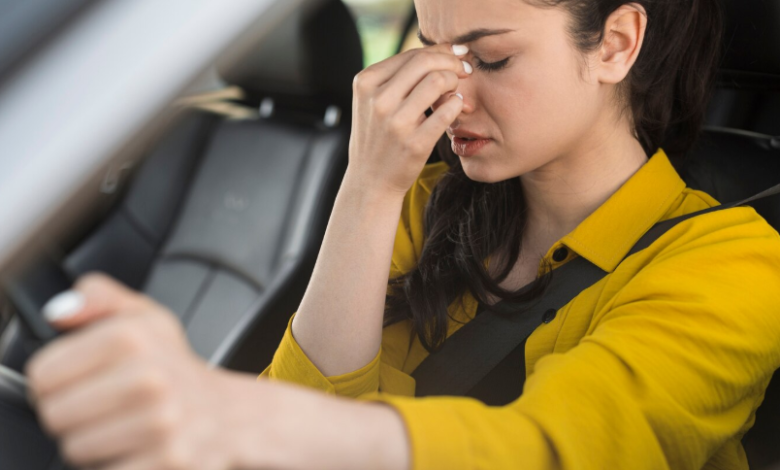Understanding Auto Accident Pain: Symptoms You Shouldn’t Ignore After a Crash

Understanding Common Auto Accident Pain
Recognizing Pain Post-Accident
It’s super common to feel some kind of pain after a car crash, even a minor one. Your body just went through a lot! Sometimes it’s obvious, like a cut or bruise. Other times, it’s more subtle, like a dull ache that you might brush off. The important thing is to pay attention to your body and not ignore anything that feels off. It’s easy to think you’re fine in the immediate aftermath, especially with adrenaline pumping, but pain can show up later.
Types of Pain to Be Concerned About
There are a few different kinds of pain that should raise a red flag after an auto accident. These aren’t just your run-of-the-mill aches. We’re talking about pain that could signal something more serious. Here’s a quick rundown:
- Sharp, stabbing pain: This could indicate a fracture or a tear.
- Dull, persistent ache: This might be a sign of soft tissue damage, like whiplash.
- Radiating pain: Pain that travels from one area to another could mean nerve damage.
- Pain accompanied by numbness or tingling: This is another sign of potential nerve issues.
It’s easy to dismiss pain as just being sore after an accident, but it’s better to be safe than sorry. If you’re experiencing any of these types of pain, it’s worth getting checked out by a doctor.
Why Pain Might Appear Later
Sometimes, auto accident pain doesn’t show up right away. This can be due to a few factors. Adrenaline, as mentioned before, can mask pain in the immediate aftermath of the accident. Also, some injuries, like soft tissue damage, can take time to develop inflammation and cause noticeable pain. It’s not unusual to wake up the next day (or even a few days later) feeling much worse than you did right after the crash. Don’t assume you’re in the clear just because you feel okay initially.
When Auto Accident Pain Becomes Serious
Signs That Require Immediate Attention
Okay, so you’ve been in a car accident. It’s normal to feel a little sore, right? But how do you know when that soreness is something you should really worry about? It’s all about paying attention to your body and knowing the red flags.
- Severe headaches that just won’t quit. We’re talking headaches that don’t respond to over-the-counter meds or just keep getting worse. This could be a sign of a concussion, a brain injury, or even something like a blood clot. Don’t mess around with this one.
- Dizziness, confusion, or memory problems. Feeling disoriented or having trouble remembering things after a crash? That’s a big deal. It could point to a concussion or a more serious brain injury. Get it checked out ASAP.
- Numbness or weakness in your arms or legs. This could indicate nerve damage or a spinal cord injury. Time is of the essence here, so don’t delay seeking medical help.
Listen to your body. If something feels off, it probably is. Don’t try to tough it out or assume it will go away on its own. It’s always better to be safe than sorry when it comes to your health.
When Delayed Pain Is Serious
Sometimes, the pain doesn’t hit you right away. You might feel okay at the scene of the accident, but then a few days or even weeks later, BAM! Pain. Delayed pain can be tricky because it’s easy to dismiss it as just being sore or stiff. But here’s the thing: delayed pain can be just as serious as immediate pain.
So, when should you be concerned about delayed pain?
- The pain is getting worse over time. If the pain starts out mild but gradually increases in intensity, that’s a red flag.
- The pain is accompanied by other symptoms. Things like numbness, tingling, weakness, or changes in bowel or bladder function should never be ignored.
- The pain is interfering with your daily life. If you’re having trouble sleeping, working, or doing the things you enjoy because of the pain, it’s time to see a doctor.
Why You Shouldn’t Ignore Minor Pain
Okay, let’s be real. After a car accident, you might have some aches and pains that seem pretty minor. Maybe it’s just a little stiffness in your neck or a slight ache in your back. It’s tempting to brush these things off, especially if you’re busy or don’t want to deal with going to the doctor. But here’s the deal: even minor pain can be a sign of a more serious underlying injury.
| Symptom | Possible Cause | Action |
| Mild neck pain | Whiplash, muscle strain | Monitor symptoms, consider a doctor’s visit if it persists or worsens |
| Lower back ache | Muscle sprain, disc injury | Rest, ice, and if no improvement, seek medical advice |
| Persistent headache | Concussion, whiplash, stress | Over-the-counter pain relief, doctor if severe or persistent |
Ignoring pain can lead to:
- Chronic pain conditions that are much harder to treat down the road.
- Delayed diagnosis of serious injuries, which can make them harder to treat.
- Increased risk of long-term complications, like arthritis or nerve damage.
Delayed Auto Accident Pain Symptoms
Sometimes, you don’t feel the full impact of a car accident right away. It’s weird, I know. You might walk away thinking you’re fine, only to wake up a few days later feeling like you’ve been hit by a truck. That’s because some injuries take time to show themselves. The initial shock can mask pain, or inflammation can build up gradually. It’s important to pay attention to your body in the days and weeks following an accident.
Stomach Pain After a Crash
Okay, so stomach pain after a car accident? That’s not something to ignore. It could mean you have internal injuries or bleeding. I’m not a doctor, but that sounds serious. The pain might not be immediate; it could develop over hours or even days. If you’re experiencing abdominal pain, especially if it’s accompanied by dizziness or bruising, get it checked out ASAP. Seriously, don’t wait on this one.
Tingling or Numbness After a Crash
Tingling or numbness? That could be a sign of nerve damage. It might not show up right away, but if you start feeling weird sensations in your arms, legs, hands, or feet, it’s worth investigating. Nerves can get compressed or damaged during a crash, and it can take a while for the symptoms to appear. Don’t just brush it off as nothing; get it checked out by a medical professional.
Behavioral Changes After a Crash
This one’s tricky because it’s not always obvious. Sometimes, after a car accident, people experience changes in their behavior. They might become more irritable, anxious, or have trouble sleeping. These changes can be subtle, and you might not even realize they’re related to the accident. But if you notice a shift in your mood or personality, it’s worth considering whether it could be a delayed reaction to the trauma.
It’s easy to dismiss these kinds of changes as stress or just “not feeling like yourself,” but they can be a sign of something more serious, like a concussion or post-traumatic stress. Pay attention to yourself and your loved ones, and don’t hesitate to seek help if you notice anything concerning.
The Importance of Immediate Medical Evaluation
Immediate Steps After a Car Accident
Okay, so you’ve just been in a car accident. What now? First things first: safety. If you can, move your car to a safe spot away from traffic. Check yourself and anyone else involved for obvious injuries. Even if you feel fine, call emergency services. Seriously, do it. A quick check by medical pros can find stuff you might not even realize is there.
- Move to safety.
- Check for injuries.
- Call for help.
It’s easy to think you’re okay after a crash because adrenaline is pumping. But that stuff can hide pain and injuries. Getting checked out right away is super important.
The Importance of Getting Checked Out
Even if you feel like a superhero after the accident, get checked out by a doctor. Seriously. They can spot injuries that might not show up right away. Soft tissue damage, spinal issues – these things can take time to become painful. Plus, a doctor can look for possible delayed injuries and tell you what to watch out for.
- Identify hidden injuries.
- Get a baseline assessment.
- Document everything for insurance.
Knowing When to Worry About Pain
So, when should you start to freak out about pain? Well, any new or worsening pain after an accident is a red flag. Don’t just tough it out. If you’re having severe headaches, dizziness, stomach pain, or numbness, get to a doctor ASAP. And remember, even minor pain can be a sign of something bigger brewing.
- Severe headaches.
- Dizziness or confusion.
- Stomach pain.
Long-Term Effects of Unaddressed Auto Accident Pain
Why Ignoring Pain After a Car Accident Can Lead to Long-Term Issues
So, you’ve been in a car accident, and maybe you’re thinking, “It’s just a little soreness, I’ll be fine.” But ignoring that pain could really come back to bite you later. Neglecting pain, even if it seems minor, can snowball into some serious long-term problems. We’re talking chronic pain, limited movement, and a whole host of other issues that can seriously impact your quality of life. It’s like ignoring a small leak in your roof – it might not seem like a big deal at first, but eventually, it’ll cause major damage.
Understanding the Nature of Accident-Related Pain
Accident-related pain isn’t always straightforward. Sometimes it’s obvious, like a broken bone. But often, it’s more subtle, like soft tissue injuries or whiplash. These types of injuries might not show up right away, but they can cause problems down the road if they’re not addressed. For example, a seemingly minor strain could lead to chronic back pain if you don’t get it checked out. It’s important to pay attention to any new or unusual pain after an accident, even if it doesn’t seem that bad.
Can I Develop Chronic Pain From a Car Wreck?
Yes, absolutely. Chronic pain is one of the most common long-term effects of car accidents. It can develop from a variety of injuries, including whiplash, back injuries, and nerve damage. The thing about chronic pain is that it can be really difficult to treat, and it can have a major impact on your ability to work, sleep, and enjoy life. That’s why it’s so important to get any pain checked out as soon as possible after an accident. Early intervention can often prevent chronic pain from developing in the first place.
Ignoring pain after a car accident is like ignoring a warning light on your car’s dashboard. It might seem okay for a while, but eventually, something’s going to break down. Don’t let that happen to your body. Get checked out by a doctor, even if you think it’s nothing serious.
Specific Auto Accident Pain Concerns
Identifying Whiplash and Neck Pain
Whiplash is a common injury from car accidents, especially rear-end collisions. It happens when your head is suddenly forced backward and then forward, straining the muscles and ligaments in your neck. Symptoms can include neck pain, stiffness, headaches, and even dizziness. It’s important to get checked out by a doctor or an injury chiropractor if you think you might have whiplash, even if the pain isn’t severe at first. Early treatment can help prevent long-term problems.
Severe and Persistent Headaches
Headaches after a car accident are pretty common, but some can be a sign of something serious. A mild headache might just be from stress, but severe or persistent headaches could indicate a concussion, whiplash, or even a more serious head injury like a brain bleed. Pay attention to the type of headache you’re experiencing. Is it a throbbing pain, a constant ache, or something else entirely? If your headache is accompanied by other symptoms like nausea, vomiting, blurred vision, or confusion, seek medical attention right away.
Dizziness, Confusion, and Memory Loss
Dizziness, confusion, and memory loss after a car accident are red flags. These symptoms can point to a concussion or other type of traumatic brain injury (TBI). Even a mild concussion can cause these symptoms, and it’s important to get evaluated by a doctor to rule out anything serious. Don’t try to tough it out or assume it will go away on its own. Brain injuries can have long-term effects if they’re not treated properly.
It’s easy to dismiss these symptoms as just being shaken up after an accident, but it’s always better to be safe than sorry. Getting checked out by a medical professional can give you peace of mind and ensure that you’re getting the treatment you need.
Frequently Asked Questions
Why should I see a doctor right after a car accident if I feel fine?
It’s super important to see a doctor right after a car accident, even if you feel okay. Some injuries, like internal bleeding or concussions, might not show up right away. Getting checked early can stop problems from getting worse and make sure you get the right care.
How long does pain usually last after a car crash?
The time it takes for pain to go away depends on how bad your injury is. Small injuries might get better in a few weeks, but bigger ones could take months. If your pain sticks around or gets worse, you should definitely talk to a doctor.
Can I end up with long-lasting pain from a car wreck?
Yes, absolutely. If you don’t get injuries from a car accident treated, they can lead to long-lasting pain. That’s why it’s so important to follow your doctor’s advice and go to all your follow-up appointments to avoid problems later on.
Should I see a chiropractor after an accident?
Seeing a chiropractor can be really helpful, especially if you have neck pain (like whiplash) or back pain. They can help reduce your pain and help you get better.
Why shouldn’t I ignore even small pain after a car accident?
Don’t ignore any pain, even if it seems small. Sometimes, a little pain can be a sign of a bigger problem, like whiplash. If you don’t get it checked, it could lead to ongoing pain. Always get medical advice to make sure everything’s okay.
When should I be worried about pain that shows up later?
If you start feeling new pain or your pain gets worse days or weeks after an accident, take it seriously. Pain that gets worse, or comes with other issues like feeling dizzy, sick to your stomach, or having trouble breathing, could mean something serious is going on and you need to see a doctor right away.



